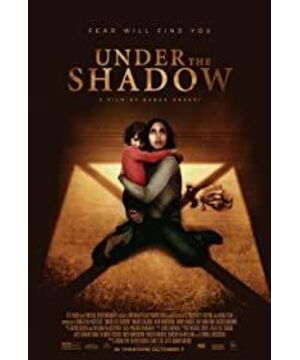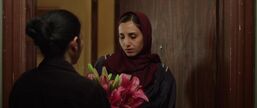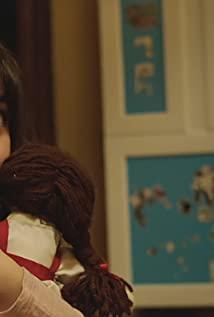How terrifying war is, and how terrifying war is under human captivity, just look at "Under the Shadow" (2016), directed by Iranian-born director Babak Unwari. War is not about playing a house, setting off firecrackers, or the "sweetness" of shouting and killing on the Internet. War means bloodshed and death, meaning that life is devastated, and homes are destroyed... As said in the film, where there is wind, where There is fear and anxiety. The film will represent English at the Oscars for "Best Foreign Language Film", another "Her"-style exception.
1
Speaking of the background of the film, it is necessary to review the history of the time. In 1979, the "February Revolution" occurred in Iran, which overthrew the pro-Western secularized Pahlavi dynasty. The original normal way of life was immediately replaced by the strict regulations under the system of the integration of state and religion. Women must go out. Wearing a black robe and a veil, people must be cautious in their words and deeds. If they are not careful, they may be detained. If women do not follow the rules, they will be whipped. This is a manifestation of fundamentalism.
The Iraqi Saddam regime, who believed in secularization, felt a great threat in the face of such a neighbor. Most of the Iraqi residents were Shiites, while Saddam's ruling class was a minority of Sunnis. In a Shiite-majority country, such religious strife inevitably exploded. In addition, the ethnic contradictions are becoming more and more obvious. The main body of Iraq is the Arabs, and the Iranians are the Persians. The two have always had disputes in history. Instigated by religious conflicts and ethnic disputes, the territorial boundary disputes became more and more prominent. The Shatt al-Arab River (formed by the confluence of the Euphrates and Tigris) at the junction of the two countries became the tipping point of the conflict, which started in Iraq on September 22, 1980. The first shot was fired, and the 8-year meat grinder-like "Iraq-Iraq War" finally broke out.
Iraq used its air superiority to launch missiles at cities such as Tehran, the capital of Iran, and residents fled. Tehran was almost reduced to an empty city, but a year later, Iran launched a massive counter-offensive. The tug-of-war between the two sides lasted until August 20, 1988. The truce was officially announced, and the result was a stagnant battle. The number of casualties between the two countries has reached one million, especially in Iran, and the economic loss has reached hundreds of billions of dollars. For both sides, there is no winner, it is a completely lost war.
Another result of this war is the subsequent collapse of Saddam's regime. Shortly after the "Iraq-Iraq War" ended, Saddam sent a large army to invade Kuwait. Originally, Kuwait, the little brother with the majority of Sunnis, has been supporting Iraq during the "Iraq-Iraq War", causing Iraq to owe huge debts. When Saddam's head became hot, what debt should he pay? He could just kill you. But the Arab countries headed by Saudi Arabia quit and asked the United States to come forward and form an alliance (including Syria involved), so the first "Desert Storm" launched by Bush Sr., "Tomahawk" missiles launched from the sea from the sea In the air, Saddam was driven out, and Kuwait was restored as a sovereign state.
Saddam couldn't swallow this bad breath and fought with the United States to the death. As a result, on March 20, 2003, George W. Bush launched the second war against Iraq under the pretext of destroying Iraq's "weapons of mass destruction". The Second Gulf War", Saddam's army was completely defeated, and as a result he himself was sent to the gallows. If the first "Desert Storm" was due to Saddam's invasion of a sovereign country, and the coalition led by the United States and Britain still had a legitimate reason to fight back, then the second war against Iraq would appear extremely reckless, arbitrary and inappropriate. value.
The fact is that Iraq did not have weapons of mass destruction at that time, and there was no evidence that Saddam was associated with al-Qaeda. For the United States itself, it was a strategic failure and a failure, and the United States spent trillions of dollars for this. , is equivalent to overthrowing a dictator Saddam, Iran lost a strong enemy, and gradually let Iran take the lead, and then the "Iran nuclear" issue over the years has caused Israel to panic, and the Middle East has lost its original strategic balance In this pattern, Iran has attacked everywhere, supporting Hamas in Gaza and Hezbollah in Lebanon, which are opposed to Israel. The Yemeni civil war has also become a proxy war because of the Houthis supported by Iran and the Saudi-led coalition.
Similarly, the Assad regime supported by Iran is still struggling to support it in Syria, and Russia, for its own strategic interests, has fully supported Assad's current regime, and peace in Syria has become even more distant. Interestingly, the Iraqi army supported by the United States is now fighting against the ISIS extremist organization in Mosul, while Aleppo in Syria is bombed by Russian planes every day. There is no leisure, and terrorist attacks are carried out everywhere. Therefore, the war has brought immeasurable blood, tears, pain and disaster to the people of the Middle East.
2
The reason why I say so much is that the cause and effect are repeated, and the current situation in the Middle East is to some extent related to the "February Revolution" and the "Iraq War" in 1979. Of course, to trace the source of the chaos, we have to say that the Soviet Union invaded Afghanistan in December 1979. It was because of the Soviet aggression that young people in the Middle East like bin Laden joined the guerrilla war against the Soviet aggression from all directions. The guerrilla war, in which the Americans used guns and guns, lasted for ten years and drove the Soviets away. As a result, these guerrillas could not find the motivation to advance and the direction of the battle. Instead, they turned their guns to settle accounts with the Americans, and established Al Qaeda. .
Then the rise of the Taliban made Afghanistan a mess. As a direct result, it also led to the "September 11" terrorist attack created by bin Laden, which led to the "war on terror" of the United States for so many years. Therefore, in the chaos in the Middle East, we can see the shadows of the two major powers, and both are inseparable. The Soviet occupation of Afghanistan can be said to be the source of the chaos in the modern Middle East, and it is also a major reason for the collapse and disintegration of the Soviet Union. The rise of fundamentalism , is also the result of this series of turmoil.
This is a big chess game in the Middle East. It is necessary to sort out these disputes and chaos, in order to find the root and essence of the problem in the chaos, and also to see clearly the source of terror explained in "Under the Shadow".
3
The heroine of the film, Hiddhe, was originally a medical student. Because of her radical political leanings, she was not tolerated by the authorities and refused to return to the university to complete her studies, which caused her suffering and blows. Political differences, coupled with family trivial matters, led to many quarrels and conflicts with her husband, who is a doctor. On the contrary, the youngest daughter, Dorsa, is cute. She likes to play with the new boy, Mehdi, who lost both parents in the war.
In 1981, after the "Iraq-Iraq War" broke out, Sidhe's husband was drafted into the army and sent to Abadan, where the war was the most intense. Of course, the husband wanted her to take the child to his parents' house for a temporary shelter, but Hiddhe refused. She is an independent and free woman, completely secular.
In order to relieve pressure, she would take a video tape in the morning and secretly dance and exercise with American aerobics at home, which was unimaginable in Iran, which was imprisoned at the time. Even when she came home from abroad, she would throw away her long black robe and veil, and these rules of wrapping did not work for her at all.
As soon as the air-raid alarm came, she took her daughter and ran to the air-raid shelter downstairs with her neighbors. But a missile fell from the sky and went straight into the roof of the building where she lived. It didn't explode, and the old man upstairs was scared to death.
The owner, Ibrahim’s family, has been infiltrated by gods everywhere. His daughter, Dolsa’s beloved little doll, Chimia, has disappeared mysteriously. She asked her mother to find it, but she couldn’t find it. Elsa's temperament is unstable, and her fever has not subsided. Hidm, who does not believe in gods, has to face this terrifying situation from time to time. As the war intensifies, the atmosphere of fear fills the sky over Tehran. The old lady Falku and his wife, the neighbors who often take care of her daughter, also have to leave. Fly to my son's house in Paris. The neighbors left one after another, especially the landlord's family, together with the departure of the nephew who lost both parents from the war, bringing unprecedented terror to the building.
In the legends of the Islamic world, there is a supernatural creature, which is listed as three kinds of intelligent creatures, the so-called giants, along with humans and angels. Djinn are said to be able to communicate with humans in a form that is invisible to humans. Whether the mysterious stuff that appears in this film is the legendary giant is unknown. Let it be customary to call it a ghost, because it terrifies the mistress.
Although the missile was removed, the pierced roof was nailed with canvas, and the windows of the house were sealed with plastic tape, lightning-like ghosts appeared from time to time, and even possessed their daughter Dorsa from time to time. It's too much for Hidham to deal with. That night, she was so frightened that she ran to the dead street with her daughter in her arms, but was caught by the authorities because she was not wearing a black veil. The person said that this time she was exempted, and next time she would be whipped. .
She found that the videotape of the gymnastics had been shredded and thrown in the trash. Her daughter said that she did not do it, and that there were only invisible ghosts. Ghosts are always hostile to everything that is considered normal, as they fear the light. From this, the implication of the film is self-evident.
In this way, the world outside the building is also unable to settle down, so they have to return to the building, where there is another elusive stuff. The most hateful thing is that the ghost actually turned into a woman, trying her best to seduce and provoke her daughter, who regarded her mother as an enemy. A doll locked Hidm's legs, and he couldn't go anywhere. If he didn't find this Chimia, his daughter wouldn't give up, and his high fever wouldn't go away. She was completely imprisoned, nailed to death in this critical building. She even took her daughter to see a doctor who is a classmate. He said it was because you were under too much pressure, but there was no good medicine.
4
The mother and son had to huddle in the building pitifully, trying their best to find Chimia all day. When the ghost flashed by, she could only call out to her daughter hoarsely, and the ghost could control her daughter, but not yet fully control her.
She came to the top of the building, carefully lifted the canvas, and found a medical book she valued. It was locked in a cabinet, but it was abandoned here. It's really bizarre and weird. You can't help but believe that there really is a ghost. The mother who passed away a month ago gave her a book with her mother's blessing because she was admitted to a medical university.
She ran home and opened the cabinet where the books had been kept, where Chimia, who had broken her body, was there. The ghost replacement was so realistic that it seemed to have penetrated into her heart. My daughter said that Kemiah is dead, I don't want it, I want to live. Hidham had to put her to sleep, tape it over, and give it to her daughter.
But the ghost will not give up, using all kinds of ghosts and horses to kill the mother and daughter of Hidm. Fortunately, Hidham was not intimidated (I did get goosebumps), and the daughter also rescued her mother from the quagmire. In the end, she ran to the yard with her daughter in her arms, drove her car through the closed gate, and rushed out.
The film combines the high-quality elements of thrillers such as "Cold in Cold Blood", and even the sudden "click" sound of the bread maker will startle us. The corridors, doors, windows and the roof of the cracks have become the passages for the ghosts to fight with Hidhe. The rising rhythm strongly matches the tension of the plot, making the film feel like being in a huge labyrinth from beginning to end, with people and ghosts circling, rising and falling to the bottom of the cliff.
The husband represents authority, a symbol of shadow power, and a woman can only be a vassal, a shadow fleeing from the shadows. The people became the victims of the war, and in the same way, they became the victims of the regulations. It was not easy inside and outside, and it was suffocating inside and outside. The doll is like a dead dogma, tightly binding the hands and feet of the mother and daughter, leaving the ghosts free to drill.
The film has given us a lot of inspiration, not only in fear, but also in the face of death. No matter how the imprisonment is sealed, as long as you fight hard, it will eventually be broken. No matter how cruel the war is, as long as the will is still there, it will always survive. No matter what kind of terrifying ghost and what kind of fear it creates, the belief in freedom will not fall, and you will face it bravely. Always breaks the spooky layout. Especially for a country that imprisoned women's freedom, these unyielding wills are precious and great.
War can destroy people, and the rules of imprisonment can also destroy people. Only the light of love and freedom cannot be wiped out. This is the tempering and inevitable price of "Under the Shadow", and it also deeply touches us. In such a closed and squeezed space, people are like dolls, especially women who are unwilling to be reduced to dolls, and the price of fear that they pay has become a matter of course.
2016, 11, 9
View more about Under the Shadow reviews











